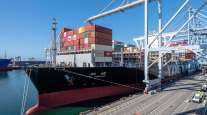Senior Reporter
Ocean Shipping Rates Begin to Decline

[Stay on top of transportation news: Get TTNews in your inbox.]
Transpacific shipping costs have fallen by 53% in the past three months, and on July 8 it cost $7,409 to transport a 40-foot container from China to the nation’s largest gateways for trade on the West Coast on a long-term contract.
According to the Freightos Baltic Index, that same container cost $15,764 to transport April 15. The drop in shipping prices comes as the Ocean Shipping Reform Act has been in effect for about a month. The law gives the Federal Maritime Commission more tools to regulate the shipping industry, and the relatively small federal agency is now in the process of hiring more investigators to oversee and monitor ocean carriers.
“I think the congestion caused by the pandemic has caused all sorts of challenges,” FMC member Carl Bentzel told Transport Topics, referencing the ongoing but lessening challenges the ports have had on the Atlantic and Pacific coasts. “I don’t think the shippers have been manipulating intentionally the market, but when you have nine carriers left, it doesn’t take much to figure out where the market is, and they have taken advantage of a very hot market.

Bentzel
“There is no proof of collusion, but this was created as a result of consumer demand because of COVID, but there’s only a small number of ocean carriers.”
On the East Coast, shipping rates from China to the Atlantic Ocean are down 43%. On April 15, it cost $17,150 to move a 40-foot container, and in early July the price was $9,882.
Bentzel said the soaring price of shipping imported items from China to the U.S. is a key factor in the increasing inflation, and he’s encouraged that shipping costs are declining. But that doesn’t mean the soon-to-be larger FMC will be backing off of its newly expanded mission. In fact, he said the new law will provide just the opposite.
“Small is a kind term. There is going to be some growth at FMC,” Bentzel said. “We have six investigators, area representatives we call them, and right now, we’re pretty minuscule. That covers the entire United States, and we do roughly $6 trillion in commercial cargo and services, related to that cargo movement.
Ocean Shipping Reform Act by Transport Topics on Scribd
“So, we have one investigator for each $1 trillion in commerce. Compare that to the Securities and Exchange Commission, and they have 150 for every trillion dollars, so it gives you an idea of the scope of the challenge we face ramping up.”
FMC now has fewer than 130 employees, and he anticipates the agency reaching 160 with the addition of investigators and attorneys, especially those that have experience in transportation-related issues.

3PL problem-solvers discuss the supply chain and how they use technology to improve their customer competitiveness. Tune in above or by going to RoadSigns.TTNews.com.
“The immediate activity will be related to enforcement,” he said. “But we’ll also be looking at maritime data and the new requirements on sharing maritime data and the new information on intermodal cargo shipping through U.S. ports, and there will be some needs there.”
The next big stumbling block for the ports could be the ongoing contract negotiations between the 22,000-member International Longshore and Warehouse Union and the Pacific Maritime Association.
PMA represents employers at 29 West Coast port and warehouse facilities, including the ports of Los Angeles and Long Beach. Between them, they are on target to process more than 21 million containers this year, which would be a record.
“While we await the signing of a new contract between ILWU and PMA, other aspects are also important when forecasting where rates are heading,” Xeneta Chief Analyst Peter Sand wrote in an online post. He said strong continued consumer spending and inflationary pressures, as well as the level of disruptions across the U.S.’s logistics network, also will impact prices.
July 1, 2022 Joint Statement from the International Longshore and Warehouse Union (ILWU) and the Pacific Maritime Association (PMA) 1/6 pic.twitter.com/MPGWw9q5sX — ILWU Coast Longshore Division (@ilwulongshore) July 1, 2022
Negotiations are ongoing in San Francisco, but the current contract expired July 1. Still, both sides have pledged they will not begin a labor action and they anticipate a multiyear agreement will be reached this summer or fall.
Both sides say they are in a news blackout, and the union and management are sending out statements on talks only occasionally.
“Both the PMA and ILWU agree that they are unlikely to reach a deal before July 1 expiration of the current agreement,” the last statement on June 14 said, just days after the two sides met with President Joe Biden during a visit to the Port of Los Angeles. “The timing is typical, and cargo operations continue beyond the expiration of the contract. Neither party is preparing for a strike or lockout, contrary to speculation in news reports. The parties remain focused on and committed to reaching an agreement.”
Want more news? Listen to today's daily briefing below or go here for more info:




